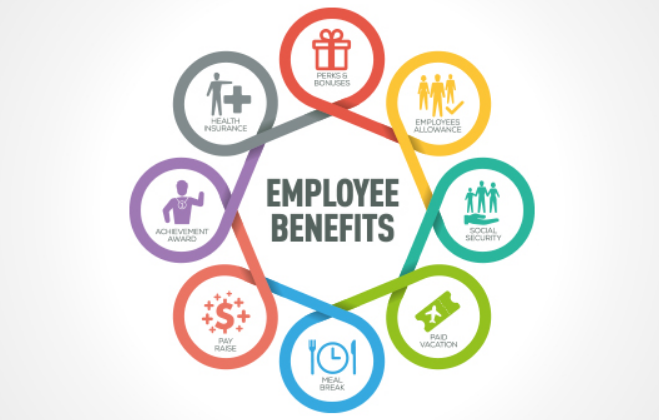In addition, pay, benefits and perks contribute to the value of a job. While some jobs will pay more than others, the benefits package is where the real value lies. Benefits and pay play a big role in how willing people are to take a new job. By giving employees more material and intangible benefits, they aid in luring talent and keeping workers. In this article, we’ll discuss the differences between total job benefits and total employee compensation. Total employee compensation (TEC) refers to the amount of money an employee is paid per hour, week, month, etc. There are various forms of payment for a job, including base pay, bonus plans, and stock options. This also includes perks provided by the employer, such as health insurance or retirement savings plans. Any additional direct payments, such as overtime pay or costs associated with a job’s duties, may also be included. The phrase “total job benefits” refers to all the perks that staff members receive from their employers, such as health insurance, access to extracurricular activities, and reimbursement for travel costs.
Table of Contents
What Does Total Compensation Mean?
The total compensation you offer your staff in exchange for their labor is known as collective compensation. It includes the employee’s base salary, as well as the total cost of the fringe benefits you provide, such as health insurance, paid time off, retirement benefits, profit-sharing plans, gym memberships, etc, bonuses, and/or commissions.
By providing a total compensation document to employees, employers can demonstrate to them the full extent of the benefits and compensation they are entitled to.
Why Is Total Compensation Important?
Gaining and keeping talent within your industry depends on total compensation and having a successful compensation management program. The search for and expectation of comprehensive and personally meaningful compensation packages is high among employees.
Candidates may reject your job offer in favor of one from a company that is extending the benefits they want if your company doesn’t offer a competitive benefits package. Additionally, if another job offers better benefits than what you do, your current employees might leave.
It is now more common to talk about total compensation early on in the hiring process. Nowadays, candidates prefer to ask about pay and benefits during the interview process. The specific requirements of applicants are just one of the many causes of this. For instance, student loan assistance, work flexibility, and career advancement are desired benefits. If you’re willing to offer these perks to new hires, discussing them in conjunction with the job responsibilities can help you attract and keep candidates’ interest and enthusiasm throughout the hiring and onboarding processes.
What Is Included In Total Compensation?
The most common benefits employers include within their total compensation package, and statement, include but are not limited to:
- Annual salary or an hourly rate of pay
- Medical and dental benefits coverage
- Healthcare flexible spending accounts or health savings accounts
- Short-term and/or long-term disability insurance
- Learning and development offerings
- Life insurance
- Paid time off, including holidays, personal, bereavement, and jury duty pay.
- Career advancement opportunities
- An employee assistance program
- Retirement benefits
- Educational assistance programs
- Relocation expenses
How Do Total Job Benefits And Total Employee Compensation Differ?
The sum of an employee’s wages, bonuses, overtime pay, and other payments is known as total employee compensation. Total job benefits, on the other hand, represent all costs incurred by your employer for things like health insurance, retirement contributions, and legal fees.
- The main distinction between the two is that total employee compensation only includes wages for employees. In contrast, total job benefits also include employer contributions to pension plans and health insurance.
- Items like employee-paid taxes, tax withholding, payroll taxes, etc. are not included in total employee compensation. These costs are included in the total job benefits.
- The fact that job benefits are an extension of a company’s brand is one of the key distinctions between total job benefits and total employee compensation. But it is possible to determine how much an employee is willing to accept by combining the total job benefits with the total pay offered by the employer.
When assessing a job opportunity, many people place an excessive amount of emphasis on the overall job benefits. For instance, a job is a good deal for employees but may not be for employers if it offers a lot of paid holidays, and a generous health insurance plan, but does not compensate for overtime work, or offer any retirement plan. When deciding how much to pay for particular jobs, it’s critical for employers to consider the total compensation of their workforce.
1. Base Salary
This kind of payment is the easiest to understand. It’s just how much a worker is paid per hour, per week, or per month. Sometimes the base salary is referred to as \”regular pay.\” Usually, state or federal laws have restrictions on this kind of compensation. In other words, it is your gross pay from your job, minus any deductions or benefits. This could be a significant amount of money depending on the nature and size of your job. The percentage of your take-home pay that comes from your base salary maybe 50% or higher, depending on where you work. A base salary is also known as \”payroll wages\” and \”full-time wages\”. A base salary and hourly pay are frequently confused. Since a base salary is the amount of money you make for a job over a longer period of time—typically one or two years—before any deductions for taxes or insurance are made, it is incorrect.
2. Benefits
The most significant perk that an employer will provide is health insurance. Employees will undoubtedly pay the most attention to this one. When employees are ill or injured, medical insurance is intended to assist them in getting care and medication. A defined benefit health plan may be provided by some employers. Working in the UK entitles you to benefits like free healthcare, which makes it a desirable option for those seeking employment in this industry. The most popular perks are flexible work schedules, free or heavily discounted alcoholic and non-alcoholic beverages, pension plans, and healthcare coverage. A variety of benefits are provided to employees by UK recruitment agencies. These can vary from company to company and may include:
- High salaries Flexible working hours
- Uniforms or company clothing
- Access to gyms, sports fields, and other facilities
- Company cars or allowances for public transport
- Company pension plans and/or private pensions
- Healthcare insurance benefits
- Meals are provided for free on days off. holiday allowance programs
- Free meals at work
- Private school fees
3. Overtime Pay
Employees who put in more hours are entitled to regular pay, which includes overtime. In the UK, overtime is compensated at time and a half, or double time. As a result, an employee who works an eight-hour shift will be compensated for 16 hours. Agency employees, who frequently receive assignment-based compensation rather than daily rates, are exempt from this rule. It is typically paid at a higher rate than regular pay and may be tax-free. Jobs like retail and service jobs, which frequently require working erratic hours, frequently pay overtime. When overtime is paid, it must be included in the job’s standard rate of pay. You should be compensated as though you worked the full number of hours if you put in more than an hour beyond your agreed-upon schedule. Overtime can be offered in several ways:
- a rate per hour that is higher than your standard rate per hour.
- a higher wage per hour or day to account for the added work.
- a fixed weekly rate that is higher than the worker’s regular weekly rate.
The most important thing to keep in mind is that overtime should always be discussed beforehand and paid according to the schedule indicated on your pay stub so you are aware of your total compensation.

4. Retirement Savings Plan
A long-term investment strategy that is created to assist people in saving for their retirement is known as a retirement savings plan. These programs, which come in a wide variety of formats, are typically established by employers or insurance providers. 401(k), 403(b), and 457(b) are other names for certain types of plans. It’s crucial to remember that not every plan is created equally. Be sure to research your options before making an investment so that you can pick the one that best suits your requirements. Simply put, a retirement savings plan is a set of financial objectives you establish for yourself. These objectives may include things like putting money aside for a comfortable retirement or buying a specific class of stock that you are enthusiastic about. Any retirement savings plan should help you save money and reach your financial objectives as quickly as possible. You will be well on your way to achieving your retirement savings plan goals by setting goals and taking the necessary steps to make them a reality.
5. Profit-sharing Plan
A profit-sharing plan (PSP) is a way for employers to split their profits with their employees. Employees who participate in profit-sharing plans receive a share of the company’s earnings. This can take the form of a wage or a cut of the company’s profits. The main distinction between a profit-sharing plan and a typical employee-centric compensation package is that in a profit-sharing plan, the profits are divided equally among all employees without regard to how much goes to whom. Therefore, it is referred to as \”sharing.\” Lessening inequality within organizations is the aim of profit-sharing plans. One might contend that unequal decision-making power can result from unequal income distribution. Poor performance, low morale, and unfair treatment are possible outcomes of this. By dividing up profits among workers according to their contributions and performance, employers can more fairly distribute wealth. Profit-sharing plans, on the other hand, appear to have little impact on either employee morale or productivity, according to some evidence. In fact, according to some studies, profit-sharing decreases employee productivity overall, employee creativity and innovation, and employee engagement compared to traditional pay structures.
6. Paid Time Off (PTO)
Employers can provide employees with paid time off, a flexible benefit that enables them to take time off without incurring financial penalties. The time can be used as personal time, vacation, or sick leave. For a few hours per week of work, paid time off benefits is typically provided. Paid time off may be acquired as a part of an annual bonus, as a lump sum at the end of the year, or in smaller amounts throughout the year, depending on the employer and the employee’s job title. When it comes to taking a vacation, having paid time off enables an employee to be certain that this priceless time off from work is used at the appropriate time. The worry and stress associated with not having enough money for a vacation when it is not guaranteed are also lessened. You will receive the full days and weeks or more of pay if you take the entire month or more. Additionally, you can use some of your PTO time to complete ongoing projects and reach milestones.
7. Task-specific Benefits
Benefits that are related to a particular job function are referred to as task-specific benefits. For example, in-house legal counsel may have access to a law library or a conference room that can be reserved for private meetings. Benefits that are particular to your job or position within the company are task-specific. They are advantages that your employer values and are directly related to your job. Working toward cost savings by reducing unnecessary activities, for instance, might be a task-specific benefit. Others might include having a sense of impact or learning new skills that you can apply to other roles. When you achieve milestones or goals, you may also feel a sense of accomplishment. You will want to continue working for the company because of all these things, which create a positive experience. Additionally, they show that your employer values your contribution enough to spend time and money on them. Benefits like these have a significant impact on employee engagement and retention rates, which can increase productivity and customer engagement.
8. Total Job Benefits
are the total amount of benefits an employee receives from all his or her employers throughout their career. Employers are aware that providing alluring benefits can help them stand out from the competition when trying to entice top talent. Total job benefits include:
- Paid vacation
- Health insurance
- Dental Insurance
- Flexible working
- Retirement savings
The sum of an employee’s job benefits can vary depending on a number of variables. These factors include the person’s age, the industry they work in, and their personal circumstances, such as their marital status or family situation. For instance, because married people tend to have more resources than single people, their total job benefits will increase. The total value of a job’s benefits also depends on how long a person has worked for a specific employer. A new hire might not have many benefits right away, but with time they might get things like paid time off. Because total job benefits don’t take into account payroll taxes or other factors that might be unique to a given employee, they are much simpler to calculate than total employee compensation. Additionally, it is much more prevalent in bigger businesses with more complicated benefit plans. Employers can benefit from total job benefits by better understanding their overall employee costs, which can give them important information about pay scales, benefits coverage, and other topics. Total job benefits are advantageous to employees because they can help them comprehend the total costs related to earning a paycheck and how they compare to similar occupations in their desired field.
9. Total Employee Compensation
In contrast to wages or salaries, total employee compensation refers to the total amount of money a worker receives over the course of their employment. The sum of all salaries, wages, and other forms of employee compensation, including overtime, benefits, and bonuses, is known as total employee compensation. Total employee compensation is sometimes referred to as “all-in” or “all-inclusive” total compensation. Total employee compensation includes
- Base pay
- Overtime pays
- Paid time off
- Sick pays
Base pay is the term used to describe an employee’s regular hourly wage as well as any additional compensation for paid time off for vacation, sick leave, or other reasons. The additional pay an employee receives for working beyond their regular schedule is referred to as overtime pay. The term “paid time off” refers to the quantity of paid time off that an employer has reserved for workers during a particular period.





